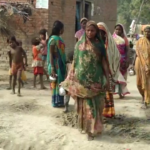As the sun sets on the Narmada river in Madhya Pradesh (MP), an old fisherman recalls the days when his community was bestowed with abundance and prosperity. Madhubhai Machware nostalgically tells Chetan Salve, Video Volunteers' correspondent, "Before this dam was built, we had led prosperous, happy lives. But in the past 30 years, things have changed. We are miserable today." Madhubhai, just like 35 other fishermen families in MP's Chikhalda Village, has spent his life on the river, making a living off the fresh water fish that the Narmada was once abundant with.
India has 14 major and 44 medium rivers and countless tributaries, floodplains, riparian tracts, mangroves and estuaries. These inland waterbodies combined together, stretch over 45,000 km across the country, making India one of the richest fish germplasm in the world. However, the reallocation of water through dams has severely affected the ecosystem of these rivers, as the downstream flows are restricted and mangroves vanish. The Narmada river is suffering from the effects of having several dams on its course. This ecological loss is rapidly affecting the breeding and nursery grounds for freshwater and marine fish.
"Earlier, we used catch at least 20 kgs of fish a day. But today, we are lucky to catch half a kilo of fish. Unless the government takes measures to replenish the supply of fish in the river, there will be no fish to be found in the Narmada," warns Madhubhai. Madhubhai's claim that the fish is depleting from Narmada river is echoed in a research conducted in the state. Mahseer, the state fish of Madhya Pradesh which was once abundant in the Narmada has been reported to be on the verge of extinction. A decade earlier Mahseer had constituted more than 50% of the catch in Madhya Pradesh's Narmada. However, the report which was released in 2015, stated that Mahseer constitutes less than 4% of the catch now. "To breed the fish need the support of natural water flow. But the fish have stopped breeding because the dam obstructs the natural flow of the river," says Madhubhai.
Since 1985, over 41,000 families have been displaced in Maharashtra, Madhya Pradesh and Gujarat by the Sardar Sarovar Project. In Maharashtra, 4,262 families have been identified so far as project-affected people. While farmers are entitled to the rehabilitation programme, fishermen are not included in the rehabilitation. This makes the situation doubly hard for the likes of Madhubhai, who have not only lost their homes but are soon losing their only means of survival. "We have been fishermen for generations, but our children are now forced to to do menial labour jobs," he says.
The fishing communities of Maharashtra have recently gained their right to fisheries in the reserve after 30 years long struggle with the state authorities. The Maharashtra government also provided the fishermen fishing boats and nets, and vehicles fitted with deep freezers for storing their catch. The fishermen demand that they have a share in the benefits arising from the Sardar Sarovar Dam and are provided with the right to form and operate local societies. "We should also get land compensation for all the watermelon plantations we have lost due to the dam," says Madhubhai.
Call to Action: Call the Cheif Secretary of Fisheries Department, Bhopal, Madhya Pradesh on +91-7552767569 and demand that Madhubhai Machware and his community gain rights to fisheries in the reservoir and extended facilities to restore the aquatic life balance in the Narmada Dam.
Community correspondent Chetan Salve reports from Maharashtra for Video Volunteers.
This video was made by a Video Volunteers Community Correspondent. Community Correspondents come from marginalised communities in India and produce videos on unreported stories. These stories are ’news by those who live it.’ they give the hyperlocal context to global human rights and development challenges. See more such videos at www.videovolunteers.org. Take action for a more just global media by sharing their videos and joining in their call for change. we could hyperlink to some VV pages, like our take action page.
Yashodhara – A salve for the social injuries of the Dalits in Mumbai’s slums.
Yashodhara Salve’s style of community journalism has led to Dalit women marshalling against atrocities they faced, women standing up against traditions that exile them from society and women going on camera to demand education for their daughters which is a basic right. The 38-year old Community Correspondent grew up in...

